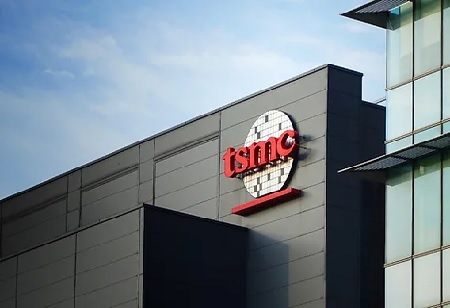
Taiwan's TSMC Reports Significant Increase in Net Profit for Third Quarter

 Taiwanese chip giant TSMC reported a larger-than-expected rise in net profit for the third quarter of 2024, driven by robust demand for smartphones and AI technology. Taiwan Semiconductor Manufacturing Company produces over half of the world's chips, which are utilized in products ranging from Apple's iPhones to Nvidia's advanced artificial intelligence hardware.
Taiwanese chip giant TSMC reported a larger-than-expected rise in net profit for the third quarter of 2024, driven by robust demand for smartphones and AI technology. Taiwan Semiconductor Manufacturing Company produces over half of the world's chips, which are utilized in products ranging from Apple's iPhones to Nvidia's advanced artificial intelligence hardware.
Tech stocks took a hit this week as Dutch tech giant ASML, which supplies chip-making machines to the semiconductor industry, unveiled a cut to its 2025 guidance and a disappointing slump in sales bookings. TSMC which is listed in Taipei and New York, said net profit in the three months to September hit NT$325.26 billion (US$10.1 billion), up 54.2 percent from the same period last year.
Revenues in the period grew 36 percent on-year to US$23.5 billion, the firm said in a statement.
"In the third quarter, revenue increased 12.8 percent quarter over quarter, as our business was supported by strong smartphone and AI-related demand for our industry-leading 3nm and 5nm technologies", the company said in a statement.
Taiwan's largest company raised its outlook for 2024 revenue in July, underscoring expectations for sustained spending on AI infrastructure from the likes of Microsoft and Amazon.
TSMC is at the forefront of a generative AI revolution, churning out the world's most advanced microchips needed to power products made by Silicon Valley. It is grappling with geopolitical tensions between the United States and China over technology import restrictions, trade, and Taiwan.
Its headquarters and the bulk of its fabrication plants are in Taiwan, a self-ruled island that China claims as part of its territory. China held a day of large-scale war games around Taiwan that included a blockade exercise that experts have warned would be devastating for the island's economy.
The United States and some European countries have blocked exports of high-tech chip technology to China over fears of military use. The semiconductor supply chain is highly vulnerable to shocks, and concerned governments have lobbied TSMC to move more production away from Taiwan.
TSMC's new overseas factories include three planned in the United States and one that opened in Japan this year. In August, the company commenced construction on its first European factory in Dresden, Germany, and is reportedly planning additional plants in Europe, specifically targeting AI chip production.

